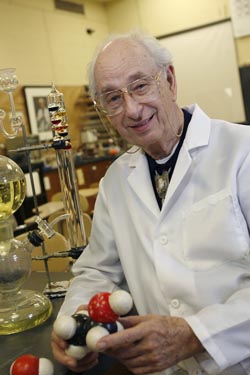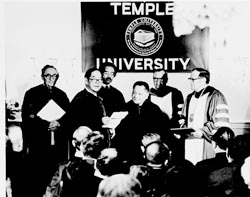Temple was among the first U.S. institutions to enter China in the late ’70s
Temple was among the first U.S. institutions to enter China in the late ’70s
| Temple University’s long-standing presence in Asia has been shaped by the pioneering work of faculty members such as Senior Chemistry Professor Dr. Joseph S. Schmuckler. For nearly three decades, Schmuckler has maintained a vital connection to the people and institutions of China, collaborating with scores of Chinese educators and graduate students in an exchange that has become a labor of love.
Temple was among the first American institutions to enter China following the normalization of U.S.-Sino relations. In 1979, Temple President Marvin Wachman presented an honorary degree to Vice Premier Deng Xiaoping. This remarkable occasion was made possible by Temple Professor Emeritus Dr. Man-Chiang Niu, a Chinese national and member of the Chinese Academy of Sciences, who knew the leader personally. A year later, Temple sent a delegation to China to establish an educational exchange. The trip spawned several new relationships, including an effort led by Temple Fox School of Business faculty member Dr. Kailin Tuan that created the first actuarial science program at Nanaki University in China. |
 Photo
by Joseph V. Labolito/Temple University Senior Chemistry Professor Joseph S. Schmuckler in his Ritter Hall lab.
|
 Photo by Steve Harlin
Temple President Marvin Wachman
(right) presented an honorary doctorate degree to then-Vice Premier Deng Xiaoping in January 1979. |
Schmuckler’s work was based out of Tianjin Normal University, and focused on improving chemical education pedagogy in the Chinese school system. A distinguished chemist and former high school science teacher, he offered workshops to the nation’s science teachers and published a comprehensive Research and Reference Textbook for Chemistry Teachers of China. The work helped evolve chemical education practices in China’s secondary schools from a rigid, examination-driven curriculum into one with greater flexibility. “Chemistry is chemistry whether it’s here or in China,” said Schmuckler. “It was a lot of give and take.”
|
|
Though Schmuckler curtailed his yearly trips abroad in 2002, his labor continues. He collaborates with colleagues via e-mail and directs a faculty-graduate student exchange program that has brought numerous Chinese students to Temple to study in his laboratory. “My whole experience has been one of human interaction about a mutual subject that we all enjoy — that is, teaching and learning chemistry and the sharing of ideas,” he said. “The long-term friendships that evolved persist even today. Many of my Chinese colleagues have become very dear friends to me.” |
|